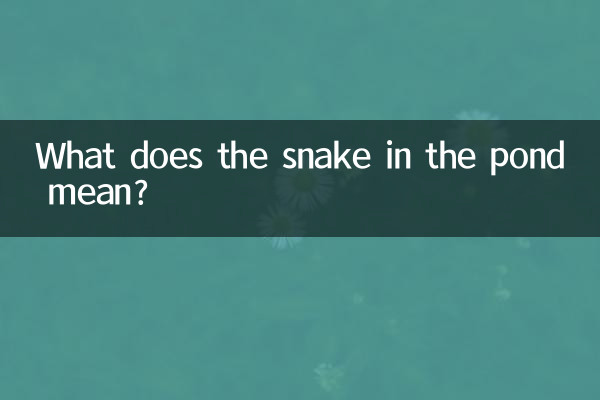What does the snake in the pond mean?
Recently, the term "snake in the pond" has sparked heated discussions on social media, with many netizens curious about its meaning and background. This article will combine the hot topics and hot content on the Internet in the past 10 days to analyze the origin, meaning and related social phenomena of "Snake in the Pond", and present relevant information through structured data.
1. The origin and meaning of the snake in the pond

"Snake in the Pond" originated from a fable circulated on the Internet. It tells the story of a snake that gradually lost its ability to perceive the outside world due to living in a small pond for a long time, and was eventually trapped in a fixed thinking pattern. This term is often used to describe people or groups whose ideas are rigid and lack innovation due to environmental limitations.
In the past 10 days, the number of searches for "Snake in the Pond" has increased significantly, and it is frequently cited in the workplace and education fields. The following are statistics of relevant data:
| keywords | Search volume (last 10 days) | Main discussion platform |
|---|---|---|
| Snake in the pond | 15,200 times | Weibo, Zhihu, Douban |
| Snake in the Pond Workplace | 8,700 times | LinkedIn, Maimai |
| Snake in the Pond Education | 6,500 times | Station B, Xiaohongshu |
2. Social discussions triggered by the snake in the pond
1.Application in the workplace
Many workplace bloggers use the term "snake in the pond" to describe employees or companies that stick to traditional work models and refuse to accept new technologies. For example, an executive of an Internet company posted on Weibo: "During digital transformation, they are most afraid of encountering the 'snake in the pond'. They would rather repeat inefficient work than learn new tools."
2.Reflections on the field of education
In the field of education, the "snake in the pond" is used to criticize cramming and exam-oriented education. An education blogger mentioned in a video on Station B: "If students only focus on test scores, they will become a 'snake in the pond' and lose their enthusiasm for exploring the world."
3.Metaphors of social phenomena
The term has also been extended to broader social phenomena, such as regional discrimination, information cocoons, etc. A highly praised answer on Zhihu wrote: "People who live in a single information environment for a long time are like the 'snake in the pond' and are prone to prejudice against others."
3. Hot events related to snakes in the pond in the past 10 days
| event | heat index | Related topics |
|---|---|---|
| A company was eliminated because of its rejection of AI technology | 9.2 | #WORKPLACECHANGE# #狗内的SN# |
| The top scorer in the college entrance examination talks about the drawbacks of exam-oriented education | 8.7 | # EDUCATION REFORM# #狗内SNAKE# |
| Social media algorithm controversy | 7.5 | #informationcocoonfang# #狗内的 snake# |
4. How to avoid becoming the snake in the pond
1.keep an open mind
Take the initiative to get exposed to new things and break your mindset. For example, regularly learn new skills or read books across fields.
2.Expand your social circle
Communicate with people from different backgrounds and avoid getting stuck in a single perspective. Participating in industry forums or interest groups is a good option.
3.Reflection and introspection
Regularly review your own behaviors and concepts, and promptly adjust those parts that are not suitable for the current environment.
Conclusion
"The snake in the pond" is not only a vivid metaphor, but also a warning to the limitations of contemporary people's thinking. In an era of rapid change, only by maintaining the ability to learn and adapt can we avoid becoming a "snake in the pond." This article shows the popularity of this topic and related discussions through structured data, hoping to provide readers with valuable reference.

check the details

check the details